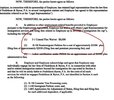Hi Iceman, thanks for getting back to me.
I have seen the application fee alone range from $200-$3,000 depending on the state. I have no doubt that the figures you mention reflect the cost of obtaining a J1 waiver in some states but, from my research, I don't think that they represent all or even most states.
Regarding medically underserved areas (MUA), the work-place does not physically have to be in an MUA to be eligible, but at least 10% of the practice's patient population has to live in MUAs. For instance, the department of public health in Washington DC told me that all of their major academic hospitals are eligible to obtain J1 visa waivers.
You are correct regarding California. North Carolina doesn't accept waiver applications from specialists either, but they are the only two states that seem totally inaccessible as far as I know. The following may be useful to individuals seeking a waiver. It is a list of states in which it is plausible for someone to obtain a J1 Waiver, assuming of course that they have someone to sponsor them
:
- Very Likely: These states do not prioritize primary care over specialist physicians and don't tend to fill their waiver spots each year:
- Alabama Colorado DC Delaware Kansas Massachusetts Nebraska Nevada New Jersey Oregon S Dakota Vermont Washington
- Likely: These states give priority to primary care, but also consider specialists. They don't tend to fill their spots for ~3-6 months though, so they're promising options:
- Connecticut Illinois Iowa New Hampshire Penn
- Possible: These states prioritize primary care and fill up within 3-months, but most years they will issue at least some waivers to specialists.
- Arizona Arkansas Florida Georgia Kentucky Maryland Missouri New Mexico Ohio Rhode Island South Carolina Texas Utah Virginia
- Possible: These states also offer pathologist waivers through the Delta Doctor's program:
- Alabama Louisiana Mississippi Tennessee

